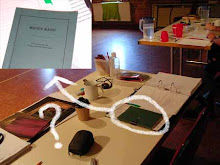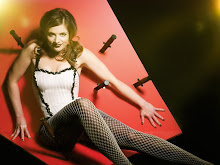It read;
Dear Lally, I know that you have done more than half a dozen collaborations with Chris Kohn. Are the plays you write with Chris different from the other plays you write?
This is Lally's response;
Don't forget to vote in the poll on the right. Remember voting is compulsory, fines may apply!
As promised, I caught up with Julia to ask her about the 'mirror' scene from the other day. As a quick re-cap, Julia is playing a couple of different characters that are similar and overlapping, and in fact one character might be said to 'play' the other at various times.
I was interested in how she was going about it, and caught up with her to talk about her process. Julia says she sees the role as actually playing 3 versions of a single character. At this stage in the process she is looking to be clear about intentions and actions. She says that she has a tendency to play 'states,' and that she is trying to work against this tendency by focusing on the action of every moment.
I ask her about her apparent starting point in voice associated with a physicality. She responds that she is naturally a thinker, and likes to 'think through things.' But, by the same token she also realises that she's not going to be able to 'think' her way through this role because the play isn't built that way. The focus on voice and physicality is part of a strategy to build another process outside of the thought process.
We talk a little bit about 'keys.' I ask her if she thinks there is a 'key' she will discover that will unlock the character(s) she is playing. Julia is not sure if it going to work that way. She says that for one of her characters an early rehearsal moment held an important key. In the rehearsal she had to strangle one of the other characters. The action of this moment provided an exceptionally strong immediate connection for her into a voice and physicality for that character. She sums up by saying that she thinks that if there is a 'key' to her role as a whole, it won't be a logical one. She thinks it could be a musical one.
Julia also makes the point that she is creating the character in collaboration with Chris. He directs her to play a moment in one way or another, and these directions and explorations also develop her sense of who she is playing. There is little point in her committing to decisions about the character if they are at odds with how Chris sees the character evolving. She is also aware that there are times when 'meaning' is made almost entirely from external factors. That is to say, a director might say, 'walk up the stairs, wait 3 beats, look left, then walk half way down again.' Externally this might carry enormous meaning, but she won't necessarily 'feel' it herself.
In today's rehearsal we continue working on the Julia's 'mirror' scene. It is a scene in which Julia's characters dialogue with themselves. To clarify the sense of the dialogue, Lally reads the other character's words. It's an interesting thing to have the writer read lines into the space. It's usually frowned upon to have a director read lines for an actor; it's usually viewed as short circuiting the actor's process. But the writer reading seems a different case. Certainly when Lally reads, Julia responds to it very positively and everybody feels that the result is a strong one.
The afternoon rehearsal is focused on a 'run' of everything we've done to date. We're only part way through the act, but even partial runs are extremely important for keeping everybody in touch with where we're up to. As has been already noted, the atmosphere in the second act is markedly different from the first act, both in the play and in the style of rehearsal. In recognition of this, rules of coming and going from the rehearsal room are modified to assist with concentration and maintaining the mood.
In contrast to first act rehearsals, not all of the performers have been in the room for every rehearsal. It is important that everybody catches up with what everybody else has been doing with Chris. Matt comments before we begin that he is reminded of a film shoot, in which the order of scenes is all of out place and it's hard to retain a sense of the 'whole.'
As they run there is a great deal of negotiation with the space. Over the last couple of days there have been a lot of props and bits of furniture and rostra making their way into the space. Costumes, too; Jim has been wearing a hat since yesterday. The space has begun to take on a new feel and shape that the run is now emphasising. The actors are working to find their way around it as they run the scenes. What do they with new pieces of set that weren't there before?, how do they sit on the new chairs?, where do they look when other scenes are running that they've not been present for previously?, where do they sit when they're offstage? how do you get to the spot to begin your scene, when you ended your last scene somewhere else? They're simple questions, and on one level they're easily solved, but on another level they are part of the entire pattern and experience of the performance for an actor. Every new thing must be assimilated into the actor's 'world.'
The run is understandably rough at this point, but like the run of the first act, the longer it goes the better it gets. When it's over Chris says he is happy with the emerging sense of the shape and flow. He talks about a tightening knot of relationships; it's a resonant image that everybody nods at. He goes on to talk about what each character sees or doesn't see of the other characters' scenes, and how they are going to work through that. He indicates that there is work to be done in filling out the picture with meaningful actions.
The actors talk about needing to plot out the play. They decide to get a big sheet of paper and plot all the characters' journeys on it. Chris talks about plotting a time-frame relative to an important moment in the piece- the sense of a countdown towards that crucial moment.
Overall, the run does what runs often do; it shows everybody just how much work there is to be done across all levels of the play. There's a feeling mild anxiety in the room. It is the end of the day, with only singing practice left to do. But it doesn't feel like the usual 'satisfied' finishing energy; people are more subdued and focused than normal. Even the actors that are leaving leave with the attitude of continued work. You get the impression that they are leaving to continue working.
Chris's word for the day – composition
Jonathon's word for the day – success



